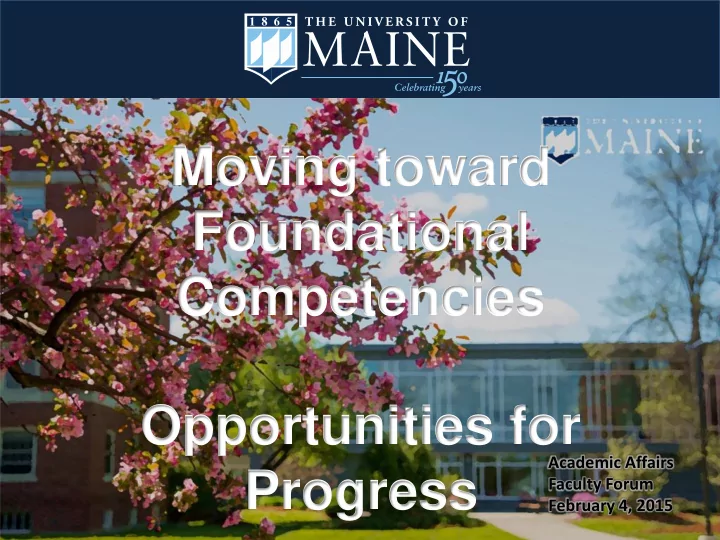

Moving toward Foundational Competencies Opportunities for Academic Affairs Progress Faculty Forum February 4, 2015
Remember when … we asked faculty panelists to reflect on the LEAP outcomes? Eric Kirsten Brian Jordan Eric Landis Patti Miles Alice Kelley Pandiscio Jacobson Doore LaBouff Asst. Research Prof., Climate Frank M. Associate Change Institute; Instructor, Taylor Professor of Associate Director of Associate CLAS/Honor School of Earth & Climate Professor of Professor s Preceptor Management Professor Assessmen Sciences; Cooperating Assist. of of Math Civil of t Prof., Department of Psychology Engineering Education Philosophy Anthropology
• What did we learn? – There is a lot of good work already happening here at UMaine – Faculty care deeply about Foundational Competencies – Faculty are unsure whether we have documented (or assessed) these Foundational Competencies – Faculty had generally positive impressions of the LEAP Outcomes
Foundational Competencies Institutional Priority : Strategic Plan, Faculty Senate, Faculty Forum
NEASC’s expectations for the assessment of General Education: • The general education requirement is coherent and substantive. It embodies the institution’s definition of an educated person and prepares students for the world in which they will live. The requirement informs the design of all general education courses, and provides criteria for its [own] evaluation, including the assessment of what students learn (Standard 4.16). • NEASC’s response to UMaine’s Spring 2014 5 th -year interim report re. institutional progress on the assessment of student learning outcomes: • The University is asked, in Spring 2019, to give emphasis to its continued success in implementing its plans for the assessment of student learning and using the results for improvement (Letter from NEASC to President Ferguson, June 26, 2014).
Foundational Competencies Mandated : NEASC, Program Accreditation Institutional Priority : Strategic Plan, Faculty Senate, Faculty Forum
Post-October Faculty Forum • Survey of the national landscape – Multi-State Collaborative Project – Kirsten Jacobson – Brian Doore – Invitation for UMaine to join – Collaboration with Faculty Senate – MOU Signed January, 2015
Foundational Competencies Mandated : Opportunity : NEASC, Program MSC, SHEEO, Accreditation AACU, Gates Foundation Institutional Priority : Strategic Plan, Faculty Senate, Faculty Forum
• What is the MSC? – It is a pilot study funded through a Bill and Melinda Gates Foundation grant that seeks to demonstrate proof of concept for the use of the AACU VALUE rubrics as a method of measuring general education outcomes. • What states are participating? – Over 70 institutions across 10 states: – Connecticut, Indiana, Kentucky, Maine, Massachusetts, Minnesota, Missouri, Oregon, Rhode Island, & Utah
• How does this benefit UMaine? – Provides a framework for essential competencies and assessment of general education – Opportunity to collaborate with universities across US – Opportunity to tap into external expertise, materials, protocols, and tools. – Chance for external feedback apart from NEASC – Provides grant dollars to support Faculty work on this – Not a binding decision for UMaine – we can use what we like – Places UMaine in a favorable position for our next NEASC self study – Places UMaine in a leadership position within the UMS vis-à-vis assessment of student learning outcomes.
What can we expect? Tentative calendar of events: recruitment and information dissemination – January : UMaine makes formal commitment to join MSC for 2015-2016 – February : Call for interested faculty to work on aligning UMaine’s General Education with the following LEAP standards • SLO 1: Written expression • SLO 2: Critical thinking • SLO 3: Quantitative reasoning
• Tentative calendar of events: planning and development – February : Recruitment and selection of interested faculty is completed. Communicate progress to campus leaders and MSC – March : Faculty meet to align UMaine and LEAP outcomes – April : Recruitment of faculty interested in using their courses as pilots for Quantitative Reasoning, Written Expression, Critical Thinking. Goal: 30 courses (10 per LEAP outcome) participating in year 1. – May : review potential pilot courses with faculty leadership, Academic Affairs, and our MSC partners. – July : Conduct a 1-day key assessment work session with faculty from the three areas. Communicate progress to campus leaders and MSC.
• Tentative: calendar of events: key assessment administration and scoring – August 2015: UMaine staff completes training on uploading of artifacts to MSC. – September-December 2015: Faculty administer key assessments as appropriate to courses. Completed key assessments uploaded to MSC (via TaskStream).
• Faculty voices: – Dylan Dryer: Associate Professor of English – Jen Tyne: Lecturer in Mathematics – Mario Teisl: Professor and Director School of Economics
Questions for Discussion • How might involvement in the MSC support your students, unit or your own work? • What do you think are the greatest challenges to implementation?
Discussion
Recommend
More recommend